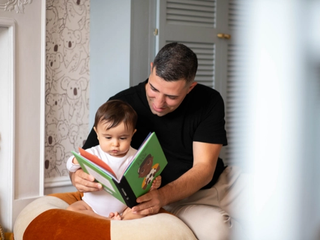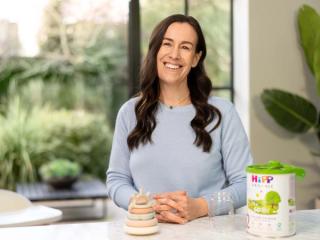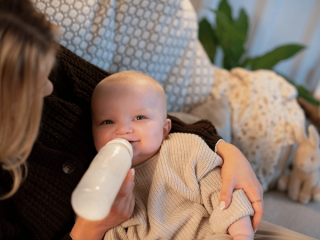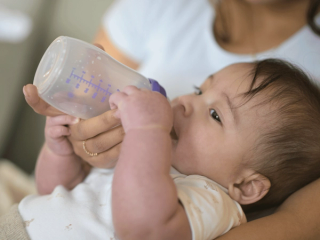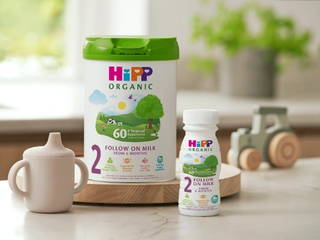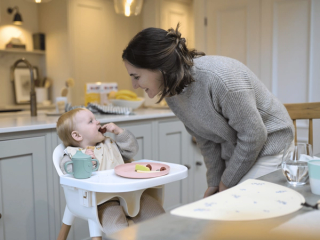
- Home
- Advice Hub
- Baby
- EU Shopping Guide
EU shopping guide
Travelling in the EU with your little one? Our EU Shopping Guide helps you navigate HiPP products available across Europe.
Holidays, visiting family or a weekend shopping in a nearby EU country – parents with babies and toddlers are travelling all over Europe. To help you find your way around our international range, we have compiled the most important information on our products sold across the European Union in our EU Shopping Guide.
Parents can always rely on HiPP - our products always meet our strict quality and safety requirements, no matter where you are. That’s our promise to you!

Using HiPP from an EU country
On all our HiPP product labels you can find the following information:
Product name
Recommended feeding age
Depiction of the main ingredients (on all weaning food labels)
Information about special product features
If there is a discrepancy in any of these four specifications, we recommend you take a quick look at the list of ingredients. Please make sure that the product is suitable for your child.
If you have any questions about our products, contact the HiPP representatives in the respective country. You can find the contact details on the label in question.
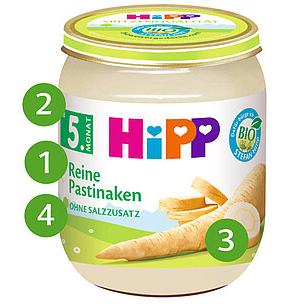
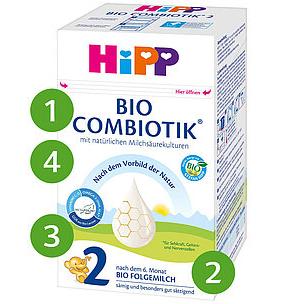
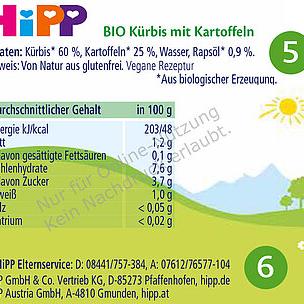
Jars, pots and pouches – do the recipes compare?
The different forms of packaging, such as jars, pots or pouches, have to meet different requirements as regards the production and filling process. This may require different recipes.
If your child’s favourite product is only available in a different packaging from another EU country, please check the ingredient list before feeding.
If you have any questions about our products, contact the Customer Service in the respective country. You can find the contact details on the label in question.
There are small differences in the list of ingredients, even though the product looks the same. Why is that?
In principle, EU laws regulate how the ingredients of a product must be indicated on the packaging. However, individual EU countries have interpreted these regulations somewhat differently. We have to comply with these local interpretations of the laws when offering a product with the same recipe in different countries.
What possible differences are there in the list of ingredients?
Different quantities of the ingredients (by percentage)
According to EU law, the quantity of certain ingredients must be indicated by percentage. This applies to ingredients that are highlighted either in the product name or the depictions on the label.
This law is handled differently in some countries. In some countries, for example, the quantity of all ingredients depicted on the label must be listed, while in other countries only certain ingredients that are important in their opinion have to be indicated in that way.
These differences in the ingredient lists do not influence the quality of the product, as the recipe is identical.
Different terminology in the list of ingredients
Another difference on the labels is the varying terminology used for certain vitamins and minerals, which is based on local laws. Some countries require very technical terminology, while others prefer to use common terms. For example, some countries use the term “vitamin C” that is quite commonly known, while others use the term “ascorbic acid” instead, which not every consumer knows as a synonym for vitamin C.
Summarising the ingredients in the list of ingredients
In some countries, a clear and concise list of ingredients is very important. One of the resulting requirements is that ingredients must be subsumed under one term and then listed in brackets, e.g. vitamins (vitamin A, niacin, vitamin E). Other countries want all ingredients listed individually and in descending order according to their amount, e.g. vitamin A, niacin, etc.
HiPP is always up to date
HiPP products are regularly reviewed and revised. The reasons for this are:
- New scientific findings
- New legal requirements
- Changing consumer demands
Once the new/adapted products are launched, they might temporarily be on the EU market at the same time as the previous versions.
What do I have to know when buying HiPP weaning food throughout the EU?
The product variety in EU countries is basically the same as you know from home. Of course, we do take into account national dietary recommendations or dietary habits, meaning that you might find slight differences.
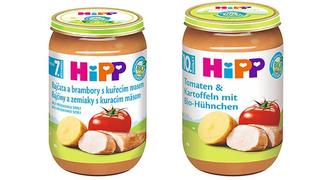
Different feeding ages for the same product
Please know that the recommended feeding age of the product you usually buy at home might be different in an EU country. Have a look at the list of ingredients to find out whether the product corresponds to the one you know from home.
Same product, different size
Our jars come in many different sizes, as eating habits vary from country to country. While feeding a dessert after every meal is a big tradition in some countries, others only serve a savoury meal and no dessert. Offering different size jars allows us to cater to various eating habits.
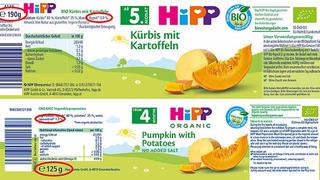
Valuable vegetable oil in HiPP meal jars
To ensure that all babies and toddlers get sufficient amounts of unsaturated fatty acids, we add the amount of vegetable oil to our jar meals that our nutritional scientists recommend. In purely mathematical terms, different jar sizes can result in different amounts by percentage. This, however, does not affect the quality of the product.
What do I have to know when buying HiPP formula throughout the EU?
When it comes to formulae, the feeding recommendations vary significantly within the EU. If you buy food outside your home country, we recommend a close look at the package information, as the preparation guide and feeding guide may vary from one country to another.
If you have any questions about our products, contact the customer service team in the respective country. You can find the contact details on the label in question.
The following applies to all HiPP products:
All HiPP formula milks are tailored to meet the special nutritional needs of babies, so that they get everything they need for their development. For more than 50 years, we have dedicated all our care and experience to producing the best formulae – in compliance with our high HiPP quality standards all around the globe. This is why all HiPP formulae are equally safe for babies no matter where they live.
PRE, 1, 2, 3, 4, Growing-up Milk or Junior – what’s that all about?
Formulae are categorised as PRE, 1, 2, 3, 4, Growing-up Milk or Junior by the country. You find this category on the front of the packaging of all HiPP formulae.
Infant formulae are stage 1 and PRE formulae. Your little one can drink these formulae from birth onwards. When it comes to stage 2, 3, 4, Growing-up Milk or Junior formulae, you can find further information on the recommended feeding age on the front of the packaging
About starch in formulae
Starch is added to formulae to make them creamier. In countries such as Germany or Austria, we add starch to stage 1 formulae as well as follow-on formulae from six months.
We also list starch as one of the ingredients in the HiPP formulae concerned. Furthermore, you can read up on the exact starch content in the nutritional information on the packaging. Starch-free formulae can easily be distinguished from those containing starch as they include a label on the packaging that says “lactose only”.
The preparation guide dictates the composition of our HiPP COMBIOTIC ®formulae
Our HiPP COMBIOTIC® formula milks contain carefully selected ingredients and a unique combination of valuable nutrients that are inspired by nature. Among these special ingredients are natural lactic acid cultures.
The UK and some other countries prescribe a water temperature of 70°C for the preparation of formula milks. In these countries, we do not add the lactic acid cultures as they would be inactivated by the hot water.
If you have any questions about our products, contact the customer service team in the respective country. You can find the contact details on the label in question.

